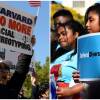Amherst College, founded in 1821 to educate “indigent young men of piety and talents for the Christian ministry,” graduated its first black student five years later. This year, the majority of applicants to the private school in western Massachusetts who have been accepted are nonwhite.
More than half of the college’s incoming class identify as students of color, compared to a third in 2001. Seventeen percent of the latest applicants admitted identify as African American.
“We believe this is the first time for Amherst, and this is a very exciting milestone for us,” said Matt McGann, dean of admissions and financial aid.
That stated commitment to diversity is one reason Amherst and other selective colleges in Massachusetts are watching whether the Supreme Court will decide this month to hear a case that charges Harvard discriminates against Asian-American applicants. At stake is whether selective colleges across the country can continue to consider race in admissions or, administrators say, lose hard-fought gains they’ve made in student diversity over the years.
At MIT, 72 percent of the incoming class are students of color, up from 42 percent twenty years ago. At the College of the Holy Cross in Worcester, 23 percent are projected to be, more than double what it was back then.
These selective schools use Harvard’s holistic, individualized approach, which takes into account the range of each student’s experiences and skills.
In November, the First Circuit Court of Appeals in Boston ruled that Harvard admissions did not violate civil rights law and admissions officials did not systematically discriminate against Asian American applicants by holding them to higher academic and personal standards.
That win for Harvard could be short-lived, though, because members of the court’s conservative supermajority have signaled that they’re ready to reconsider decades of precedent. In 1978, the controlling opinion in the Bakke case involving the University of California at Davis described Harvard's admissions process as a model for considering race in a lawful, constitutional way.
But in 2015, the court heard another case on whether the University of Texas at Austin unfairly admitted less-qualified minority students over white ones. During oral arguments, Chief Justice John Roberts questioned the value of diversity, asking: “What unique perspective does a minority student bring to a physics class?”
“I’m just wondering what the benefits are in that situation,” said Roberts, who dissented from a 4-3 decision upholding the school's admissions.
As a court reshaped by three Trump nominees considers whether to hear the Harvard case, conservatives in Massachusetts echoed Roberts' skepticism.
“It’s really an economic issue more than it is a race issue,” said Amanda Orlando, a Republican state committeewoman.
Orlando, who is white, opposes considering race in admissions, but said diversity is important.
“You want to pull from different cultural backgrounds and ethnic backgrounds in order to provide a good educational experience,” she said. “While I understand that, it can go too far and it can definitely cause unintended consequences.”
Orlando said one unintended consequence is working-class conservatives’ animosity toward selective institutions. “Any group that feels that they're being unfairly treated is going to feel that way towards the institution which is doing so,” she explained.
McGann agreed that race-conscious admissions can fuel animosity among those voters, but said the problem is administrators have failed to explain what they do and how.
“We think of students as individuals and as members of a community and not just as walking SAT scores or walking GPAs,” he explained.
McGann said his team has run several race-neutral simulations for conducting admissions at Amherst. All of them point in the same direction, he said, with “a negative effect on the kind of diverse community the college is seeking to build.”
The Supreme Court could announce as early as next week whether it will hear the Harvard case, a decision that requires the agreement of four of the nine justices. Conservatives hold a 6-3 majority on the court.









